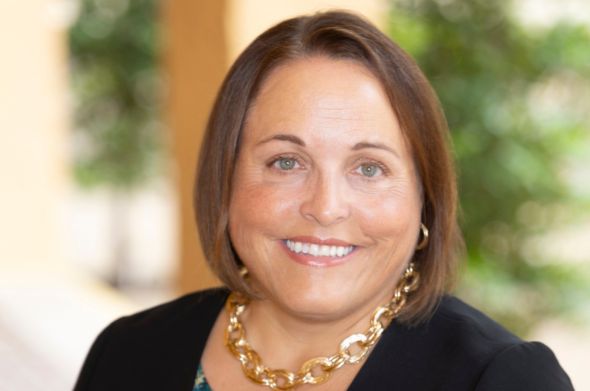Dr. Kirsten Davis Wins AALS Legal Writing Award

The Association of American Law Schools’ Section on Legal Writing, Reasoning, and Research is honoring Stetson Law Professor Kirsten K. Davis with its 2026 section award.
Recognizing an individual whose tireless work supports the advancement of the field, the award cites her extensive contributions to the legal writing community through scholarship, leadership, and transformative work, including her recent work on generative AI and legal communication.
When Davis was notified of the news during a surprise presentation arranged by Vice Dean Jason Palmer, three other luminaries from the discipline took part in the moment over Zoom and shared the reasons that Davis was the recipient of the award. She will receive the award during the AALS Annual Meeting Section Award Ceremony on Tuesday, January 8, 2026 in New Orleans.
An inspiration to colleagues
Over her 25-year teaching career, Davis has engaged her colleagues to help shape the way law schools – and, by extension, legal professionals – think about and approach legal writing. She founded the Stetson Institute for the Advancement of Legal Communication to further that mission, has produced sharp, insightful scholarship, and engaged her colleagues in forward-thinking conversations.
She has played a major role in Stetson Law’s status as a national leader in legal writing. The college is third in the nation in legal writing per US News & World Report’s 2025 rankings.
A significant aspect of Davis’s work has been shifting the discipline’s perspective on legal writing to a rhetorical one that recognizes law is appropriate for rigorous rhetorical critique, something that Stetson Law Associate Dean for Assessment and Professional Engagement Anne Mullins has found particularly influential in her own work.
“She is the person who taught me that legal writing was an inherently rhetorical exercise, and she showed me what rigorous rhetorical critique of legal texts looks like,” Mullins said. “The shift she got me to make was like going from seeing the world in black and white to technicolor.”
Davis has helped shape the future of legal education by serving in AALS leadership roles as well as on the boards of both the Association of Legal Writing Directors and Legal Writing Institute. Her body of scholarship explores the intersection of legal writing, rhetoric, and ethics, offering a rich interdisciplinary contribution. She also frequently presents at national conferences on these topics.
Leading the conversation on AI & legal communication
As generative AI began to emerge in late 2022, Davis saw the likely impact it was going to have on legal writing and higher education writ large. She founded a national conversation group on generative AI, has led workshops across the country for faculty, students, lawyers, and judges, and continues to generously share her expertise and time.
Her trailblazing work in educating the legal writing and higher education communities about the implications of generative AI is part of what led the AALS Section on Technology, Law, & Legal Education to give Davis its Technology Mentorship Award in January of 2024.
“I could not be happier to see Dr. Davis honored for her extraordinary contributions,” said University of North Dakota Assistant Professor of Law Carolyn Williams of Davis’s latest honor. “Her foresight to begin studying AI and bringing her knowledge into law schools via presentations all over the country and forming the Legal Writing and Generative AI Convo Group showcases that her work not only enriches our field—it defines it.”
Legal Research and Writing Clinical Professor Rebekah Hanley of University of Oregon School of Law said Davis has been critical to the legal writing discipline during the transition to the generative AI era.
“Her expertise, enthusiasm, and generosity are unmatched,” Hanley said. “She has led countless conversations about pedagogy, sharing key resources and facilitating productive collaboration. She has also published – and inspired – scholarship that supports both law faculty and practicing lawyers.”
Post date: Oct. 24, 2025
Media contact: Kate Bradshaw
[email protected] | 727-430-1580